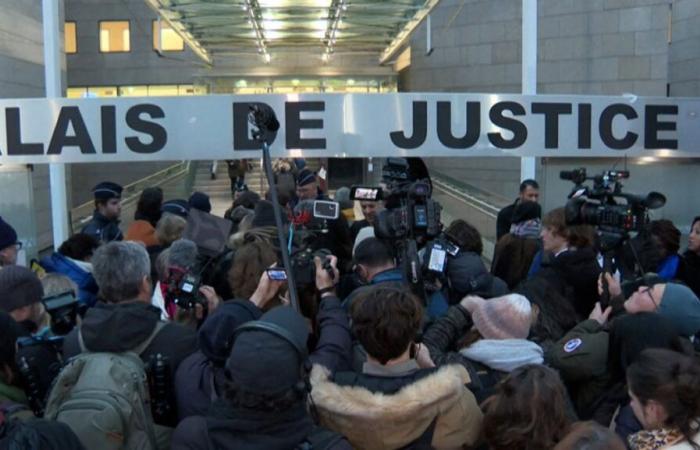
The doors of the Avignon courthouse open before the verdict in the historic Mazan rape trial. Many journalists and supporters of Gisèle Pelicot had been waiting very early to be able to access the court.
“Thank you Gisèle”: the banner which flew Thursday morning in front of the Avignon courthouse, before the verdict of the historic Mazan rape trial, summarizes the message of gratitude from women and men towards the one who wanted “let shame change sides”. Since the start of this trial, almost four months ago, of the 51 men tried, most of them for aggravated rape of Gisèle Pelicot, the walls of this city in the south-east of France have been covered with collages against sexual violence. and for women’s rights.
The latest messages from the Amazones d’Avignon collective have been posted since Wednesday evening: “Justice for all”, “Shame has changed sides, and justice?” and the greatest, “Merci“. “Rape affects women all over the world, that’s why the whole world has its eyes on what’s going to happen,” believes Ghislaine Sainte Catherine, one of the members of this feminist collective.
Between these mobilizations against sexual violence, the rush of the media, the queue since dawn to hope to have one of the rare places reserved for the public and a large police force, the verdict is awaited with excitement. Exceptional in terms of the number of accused and the facts alleged – a husband, Dominique Pelicot, who drugged his wife, Gisèle, for a decade, to rape her and have her raped in the marital home by dozens of strangers recruited on the internet – , this trial made the ravages of violence against women widely resonate.
For having renounced the closed session, to which rape victims are entitled, and publicly facing the men accused of having raped her, Gisèle Pelicot, 72, has become a feminist icon. “Thanks to her, because for many women victims of rape, the shame has now changed sides,” rejoices Pascale Platte, computer engineer.
“Courage”
In front of the court, Thursday at dawn, a 69-year-old woman had been waiting since 5:20 a.m., like every morning since the hearings began on September 2. Initially coming to discover the progress of a trial, Bernadette Teyssonières, retired from near Avignon, also expresses her gratitude and admiration for Gisèle Pelicot.
“I am impressed by the courage this woman, who had suffered all this for ten years, had to come out in the open,” she confides, “the shame must rest on the attackers”. Like dozens of other people, in the courtroom, she applauded her, day after day.
The room is likely to be full
But, on this day of verdict, Bernadette is not sure of having a place in the broadcast room, because the media from all over the world have rushed to Avignon.
There are nearly 180 accredited people, including 86 foreigners, some with several journalists. Many police officers will also be present in and around the courtroom, as 32 co-defendants appear free but could be taken directly to prison if convicted.
But for her, more than the verdict against these men aged 27 to 74 and from all social backgrounds tried in this case, it is “everything that happened before in the trial which will remain the most important”: “Trying to understand how this gentleman got there, why men, when they arrived in Ms. Pelicot’s room, still continued their action while she was inert, instead of leaving immediately.”
She hopes that this trial will make it possible to discuss more openly and widely in families the question of consent, of respect for everyone in sexuality. Hugo Mazure, an 18-year-old political science student, arrived at the court at 5:25 a.m. for this crucial day. Over the past year and a half, he’s been reading more about feminism and this trial has made him think even more about his actions as a man. “Thank you! She is clearly a symbol of a struggle which is enormous and thanks to her we will have progress!”
Trial of the Mazan rapists rapes of Mazan Dominique Pelicot Gisèle Pelicot drugs rapes crimes





